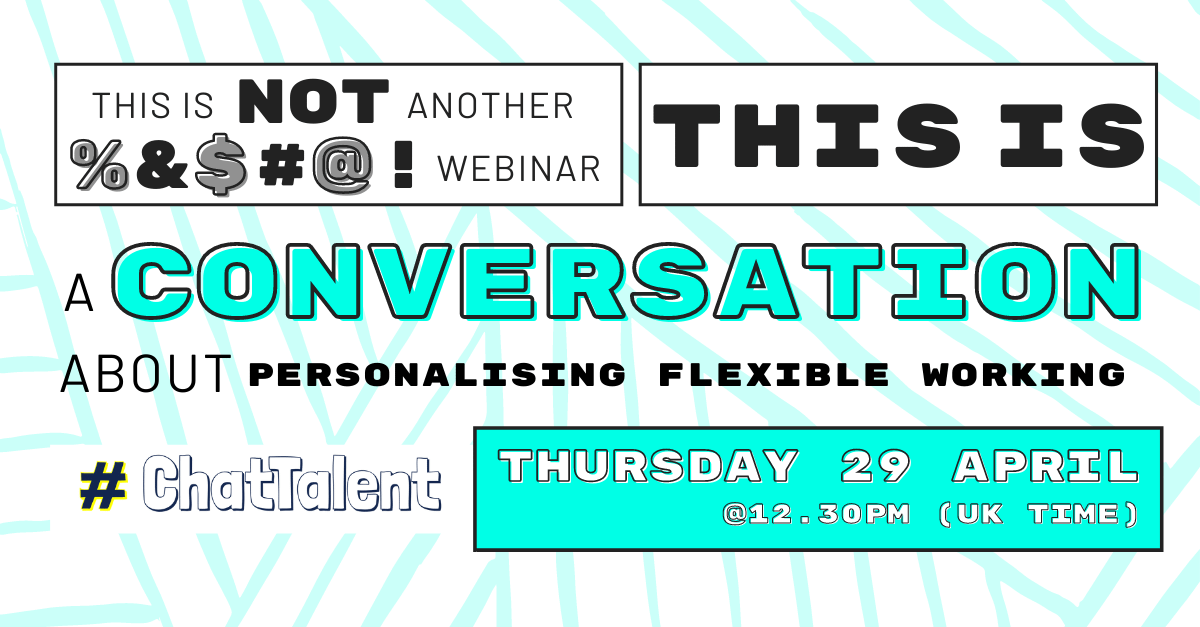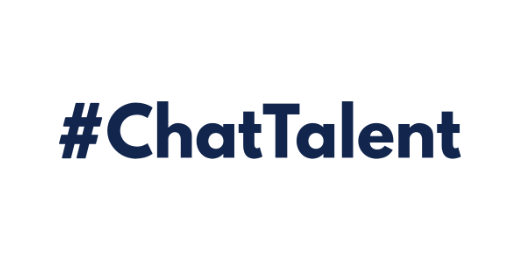Hello and welcome to our conversation all about Personalising Flexible Working.
To start us off, I gave a mini summary of the event format and reminded people of the event’s purpose – to have conversations about key topics in the HR world.
We want our events to be as interactive as possible and really move away from monologues and presentations. Essentially, the more questions, the merrier.
You may notice further down this time around, we only have two breakout sessions, while habitually, we tend to have three. We decided to experiment with the event format, and personally, I think it worked really well.
After welcoming and introducing our panellists – Sam Smith from Kelly OCG, Tom Portingale from Nationwide and Akbar Karenga from StoryBlok (who recently became a dad) – I was eager to get started.
We actually started our conversation earlier in the week, during our tech test on Monday. One thing that Sam mentioned really stuck with me – what we’ve experienced over this past year or so is working through a crisis. At best it has been working from home – but it is definitely not flexible working!
Which brings me to my first question – What is flexible working?
“It depends. Because it should be about looking at each role and then finding out what flexible working means in that particular situation. But the pandemic has started a conversation around what the future of work looks like.”
– Sam Smith
One thing that has clearly transpired from the multitude of social posts, polls and articles is that what employees want is the interaction and the socialisation that stems from working in an office, without the commute.
And our role as organisations is to clearly define flexible working.
“I think for me when an organisation thinks – flexible working – their mind immediately goes to policies or rules. But it’s not about that. I think it should be about providing guidelines.”
– Tom Portingale
“StoryBlok has been remote since 2017. But if you think about it, the general office set up hasn’t changed since 1910, apart from the open-plan design in the mid-60s. This is our opportunity for a complete redesign. To fundamentally change the purpose and feel of offices.”
– Akbar Karenga
Flexible working is a very emotive topic, and it can be value-driven. But of course, there is also a very physical aspect to it as well. How do we best support our flexible working employees?
As always, Sam mentioned it comes down to the individual role. But also the individual and the work-life balance that they are seeking. Is flexible working the best option for them? Do they have a suitable setup, fast enough Wifi?
We need to consider the experience that our employees are working in.
“I think there are certain things that organisations can do to aid their flexible workers better, but it does come down to an equitable approach. If their roles can be done from home, and whether their set up or surroundings can affect their ability to be productive.”
– Sam Smith
But there is a different side to the argument, with LinkedIn being inundated with comments like “The decision to implement flexible working is entirely up to the employer” – inviting their employees to leave if they are against the decision. Or even speculating that if everyone can’t work flexibly, then no one should.
“Over the past year, your staff have seen that it’s possible to do their role remotely. And that it worked. Yet now you’re asking them to forget that and start paying 10k extra a year for a train ticket. You better have amazingly comfy beanbags and tasty coffee to make them consider staying.”
– Akbar Karenga
Adding to Akbar’s comment, Tom mentioned that it should be about listening. Everyone’s circumstances are different, and it should be about enabling them to work wherever is best for them to do their job.
“This isn’t binary. It isn’t work-from-home or work-from-the-office. I think we need to shift the dial to – we are working differently”
– Tom Portingale
But where does the conversation around flexible working start? Should it be the employee or the employer? And what is the benefit of having a flexible approach? Specifically, the creativity and social aspects that stem from people being together in an office.
A great question from Theo Smith in the chat, asking whether the question -Should we even have set working any hours anymore (unless the role requires it)?
“Why should we try to drive people into certain boxes with time restraints? 9-5 is often not the best arrangement for everyone. What we try to do at StoryBlok is to focus on core hour, where we try to ensure everyone is available.”
– Akbar Karenga
This was a really informative and engaging discussion that continues into the sessions. Check them out below!
There’s even a cameo from Sam’s dog, Doris!
How does flexibility impact productivity?
with Sam Smith, Jeremy Russon and Trent Peterson
Who holds the power – the employee or the employer?
with Akbar Karenga, Alan Walker and Tom Portingale
I really hope you enjoyed this event as much as I did. It was packed full of information and real-world examples.
But that’s just my opinion; I would love to hear what you thought. About the setup, the topic and if we should do any more → send us an email at [editor@chattalent.net]
I also want to say a big massive THANKS to all our #Friendors who helped us promote the event.
An equally BIG MASSIVE thank you to everyone who managed to join us on the day. Thank you for supporting us as we continue to experiment and test new ways.
See you at the next one!







